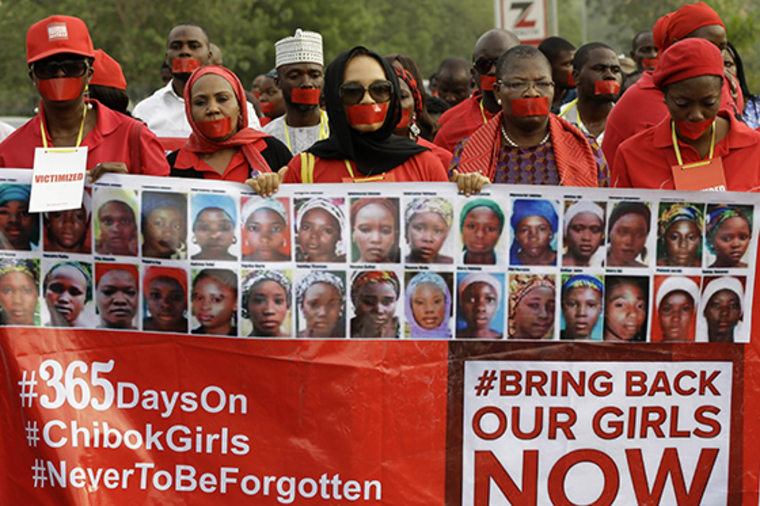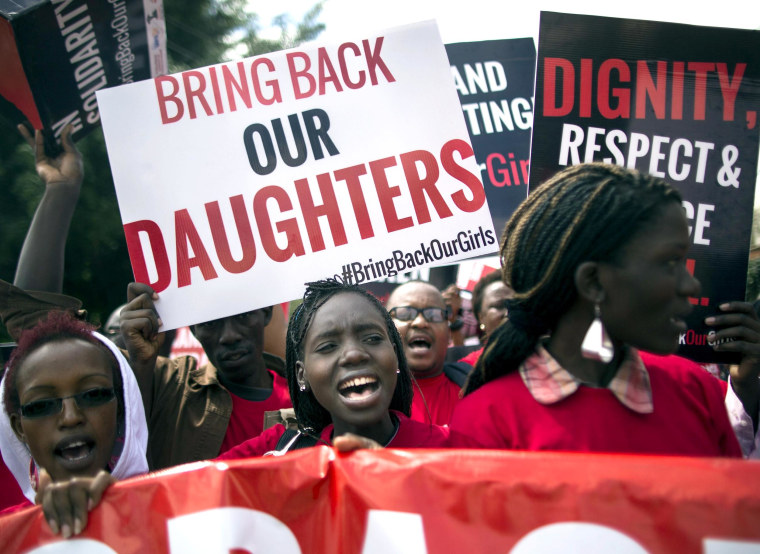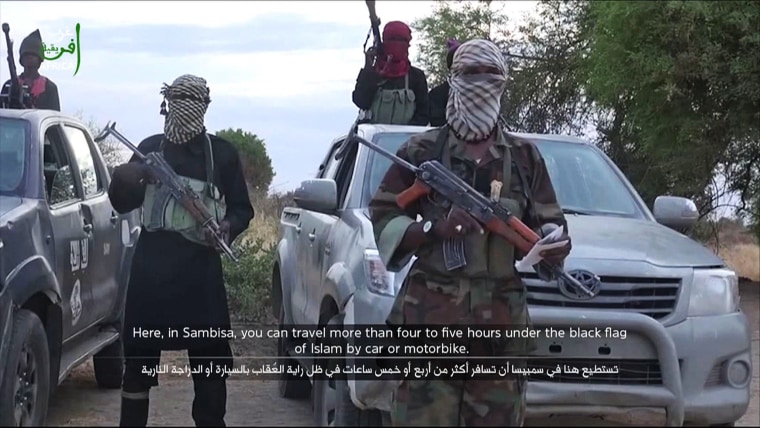On Congresswoman Fredericka Wilson’s website a clock counted down the days, hours, seconds and minutes since terrorists tore through the village of Chibok, Nigeria and ripped 200 schoolgirls from their community in a violent rampage that shocked the world.
Thursday marked two years to the day.
And, just as the social media hashtag #BringBackOurGirls, galvanized a global community — including First Lady Michelle Obama — to raise their voices in a collective outcry against such brutality, Wilson, a Florida Democrat is hoping to harness the power of social media to address “the security and humanitarian crisis in the region.” She is hosting a ‘Twitterstorm” on Thursday to refocus attention on the horrors the terrorist group has continued to inflict on West Africa and the plight of the missing schoolgirls.
“Social media is a powerful tool. It has the ability to reach millions of people,” Wilson told NBC News. “After we began the #BringBackOurGirls campaign, the world started to take notice.”
Wilson, a former teacher and school principal, plans to Tweet until every girl is found.
And she urges everyone to “Tweet prayers, pictures of remembrance, blessings for the families and words of consolation” to commemorate the anniversary for the girls’ abduction.
Women in Congress have been especially vocal on behalf of the missing girls.
Just before Mother’s Day in 2014, every female lawmaker in Congress signed letters to President Barack Obama urging his administration to push the U.N. Security Council to add Boko Haram to an al Qaeda Sanctions List. The list was aimed at requiring members to freeze the assets of anyone affiliated with Boko Haram and prevent them from crossing their borders.
The U.N. Security Council added Boko Haram to the list later that month.

This week the State Department reiterated its support for the safe return of all those taken by Boko Haram, a terrorist organization with ties to ISIS, which has kidnapped and killed thousands of people in Nigerian territories and neighboring countries for more than seven years. The Obama administration has offered support through intelligence gathering, financial assistance and psychological aid to Nigeria in its efforts to push back against the terrorist group and help victims recover.
"Unfortunately there have been thousands of people kidnapped in Nigeria," White House press secretary Josh Earnest said on Thursday adding that the Nigerian government is ultimately responsible for the effort to find the girls.
Organizations, such as Amnesty International, say more could be done.
"We have tried to push the Obama administration to press for genuine, transparent reform within the Nigerian military when it considers providing security assistance and we have also worked with other NGOs and members of congress to make sure that the situation is not brushed (aside) and forgotten," Adotei Akwei, managing director of government relations at Amnesty International USA told NBC News.
Related: ISIS Expands Into West Africa, Welcoming Boko Haram Allegiance
The U.N. High Commissioner for Refugees recently announced that over the last few months more than 135,000 people from Cameroon, Chad and Niger have fled to escape Boko Haram.
More than 2.5 million have been forced from their homes.
One million children have been forced from school causing 2,000 schools to close.
As many as 20,000 people have been killed, 2,000 of which were killed in January’s massacre in the city of Baga.
This week relatives of some of the abducted Chibok schoolgirls gathered in Abuja to watch a recently released proof-of-life video that appeared to show 15 of the students. The bittersweet moment was made all the more so, parents told members of the media, because they have not been reunited with their children.
Related: Boko Haram's Deadly Attack in Baga: Survivors' Stories
In the U.S., a chorus of congressional women have continued to raise their voices against Boko Haram's atrocities.
Over the past two years, female lawmakers and their male counterparts have taken to the floor to speak about the kidnapping and remind those listening of the perils of the rise of terrorist group. Wilson is hoping that lawmakers will make one-minute speeches each week and help support appropriations to help the female victims of Boko Haram.
Many of the women in Congress have also worn red on Wednesdays to remind the world that the girls are still missing.
And several of the lawmakers, including Wilson, Rep. Sheila Jackson Lee, D-Texas, Rep. Lois Frankel, D-Florida and were joined by Rep. Steve Stockman, R-Texas in meeting with some of the Chibok schoolgirls who escaped.
About 50 girls managed to escape soon after they were abducted. More than 200 remain missing.
Related: Boko Haram's Use of Child 'Suicide' Bombers Skyrocketed Last Year: U.N.
The tales of the survivors of Boko Haram attacks are chilling.
“Boko Haram captured a village in Northern Nigera and killed the mother and father of a young boy and girl. Later, the insurgents debated on whether or not to kill the boy. After speculating that the young boy would follow in his father’s footsteps and become a Christian pastor, the insurgents decided to kill the boy,” Wilson said. "
The little girl was tied on top of the bodies of her family and left for dead. She was rescued three days later.
Wilson says she will continue to press the United States and Nigerian governments to work together to help end these atrocities.

Though the Nigerian government claims it has nearly defeated Boko Haram attacks continue — especially on vulnerable communities.
“It represents the world’s failure to stand up to terrorism and stand for our civilization,” said Emmanuel Ogebe, an international human rights lawyer that works with the escaped schoolgirls.
Combat operations and intelligence efforts must continue to pressure these groups, said Malcolm Nance, executive director of Terror Asymmetrics Project on Strategy, Tactics and Radical Ideologies, a think tank in Hudson, New York.
Once captured, the women are exploited sexually and face mental abuse. There have also been reports that some of the kidnapped women and girls have been used in suicide attacks.
“These women are victims of gang rape and humiliation, then told that they can only redeem themselves in god’s eyes through “martyrdom” via suicide bombing,” Nance said.
Nance said the mass abductions in Chibok and other places in the region are a critical recruiting strategy to attract young men.

“(Boko Haram) promises women and children to their fighters in exchange for their willingness to attack and mass murder their own people,” Nance said.
In his work at the Education Must Continue Initiative, a organization that works to help victimized children in northeastern Nigeria, Ogebe has witnessed depression and Stockholm Syndrome among the young victims.
“Some women abused by terrorists in the faux marriages have shown sympathy towards them after their rescue by the (Nigerian) army,” he said.
At one relief camp, the rescued women were unfriendly to relief teams that brought them supplies. The military found out they were still in contact with their captors and were moved to an undisclosed location, Ogebe said.
Still, there are glimmers of progress.
Ogebe said his organization helped a teen named Dela, one of the recovered Chibok schoolgirls, begin college. After a series of delays from funding to the snow blizzard this past winter, she will continue the education she was stolen from after 660 days in captivity, he said.
Stories like that reinforce for Wilson why it's important to remember what happened.
“We must never forget what happened to the girls along with Boko Haram’s other victims," she said.
